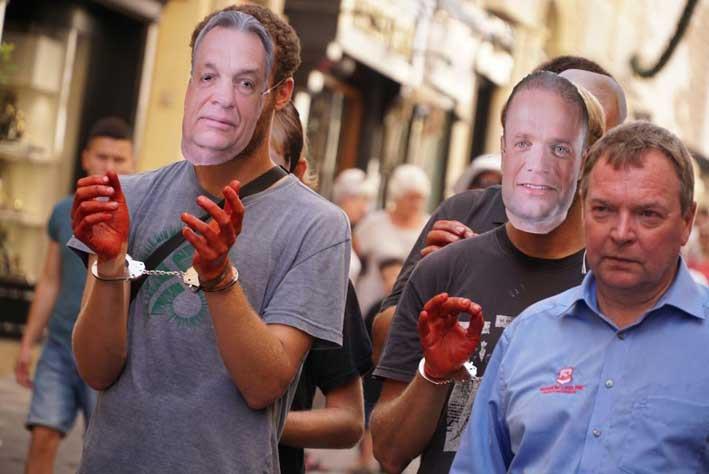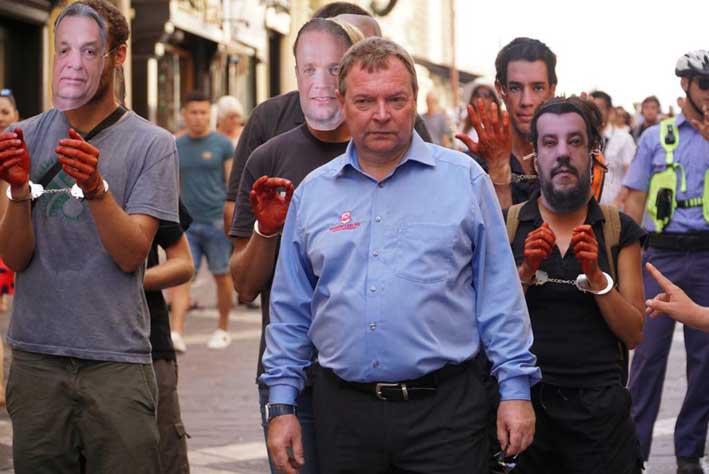Pro-immigration activists took to the streets Tuesday morning in protest against the European leaders they say are responsible for deaths of migrants in the Mediterranean.
The protestors, including Captain Claus-Peter Reisch of the Lifeline ship, marched through the streets from Castille square to the entrance of the Courts of Law. The Captain marched slightly ahead of other activists who were wearing masks of the ‘accused’ – Joseph Muscat, German Minister of Interior Horst Seehofer, Matteo Salvini, Michael Farrugia, Sebastian Kurz, Angela Merkel, and Viktor Orban.
They ‘stood accused’ of ‘actively letting people drown for the sake of national pride, wealth and irrational protectionism’.
In their statement, they made clear that ‘keeping the civil rescue fleet from saving lives is an active omission of protecting the basic human rights’, referring to those individuals crossing the Mediterranean. They continue by accusing Prime Minister Joseph Muscat and other international leaders of “purposely delaying legal processes, misusing legal loopholes, disrespecting asylum rights and disvaluing hundreds of lives in distress’, calling these methods a ‘political farce’.
They ended their statement by condemning the behavior of the aforementioned leaders, and the ‘repressing’ of ‘solidarity hosted by the civil society’.
Captain Claus-Peter Reisch Court Case
Following the statement from the protestors, the Captain’s lawyers present, Dr Cedric Mifsud and Dr Neil Falzon, said that due to the Dutch authorities not delivering the answers requested regarding the registration of the Lifeline ship, the court was adjourned to 2 October.
Claus-Peter Reisch, 57, born in Munich Germany, is charged with, as captain of the vessel Lifeline, entering Maltese territorial waters illegally and without proper registration and a licence. The prosecuting officers are also requesting the court to order the confiscation of the ship.
The MV Lifeline, with 234 migrants on board, was allowed to enter the Grand Harbour on 27 June, after spending a number of days stranded at sea. The vessel was allowed to dock after Malta and a number of EU states reached an agreement on how to share the rescued migrants. However, the Maltese government impounded the Lifeline and two other rescue ships (operated by two separate NGOs - Sea Watch, and Sea Eye), and said no private rescue vessel would be allowed in and out of the port until an investigation determined whether any international laws were being breached.
A Sea Watch member said that Transport Malta and the Port Authority had given them permission to leave Malta but the Government stepped in and removed that permission, rendering them unable to leave the island.
Delia responds to NGO criticism
A number of NGOs had stated in a joint statement that they were “shocked and disgusted” at comments made by the leader of the Nationalist Party Adrian Delia during a business breakfast organised by the party, with the theme “The Maltese Worker – A Long-Term Plan”.
Following Prime Minister Joseph Muscat’s recent comments during his Sunday interview, where he brought up recent complaints he had received from locals living in Marsa and surrounding areas with a significant population of migrants, Adrian Delia had also taken a shot at the issues stemming from mass immigration.
In their statement, they accused Delia of using “abhorrent” language “as it is intended to generate hatred, discrimination, exclusion and violence”.
In comments outside the Law Courts, PN Leader Adrian Delia cleared his position on this issue as he was questioned by activists themselves.
“I have been saying that we should also ensure that we safeguard the international human rights of people perishing at sea, because that is not only a legal obligation, but a moral obligation.”
He stated that, on diverse occasions, he had said that Europe must work on “sharing, not of a burden, but of a responsibility”. This, he says, is because saving lives is not a burden, but a responsibility.
“I think Malta can be at the forefront of proposing, because of our geographical position – actually identifying, helping, coordinating, and saving as many people as we can.”
Delia called for investments in countries from which individuals are escaping, to “be able to lessen the impact of those escaping certain dangers”. At the same time, he made it clear that he will support the government in every decision that it takes in the interest of Malta while it is in compliance with strict international law and procedure, but also, if need arose, that it be superseded when there is a humanitarian crisis.
“The government has international obligations, humanitarian obligations, but also has obligations towards us Maltese and Gozitan citizens; residents here, which also includes foreigners. The Maltese people who are a concoction of peoples coming from every nation, state, and country from the Mediterranean and further away.
“So there, there is something that government can do. Government is responsible for keeping our streets safe. Government is responsible for making a declaration that he is going to accept 70,000 new people in 4 years, and answering 1 simple question – where are we going to accommodate them?Which are the houses, which are apartments, which are areas of accommodation which the government is planning?
“That is an attack on Government not on people. That is an attack on non-planning, and not on humanitarian issues.”



Pictures and video: James Caruana